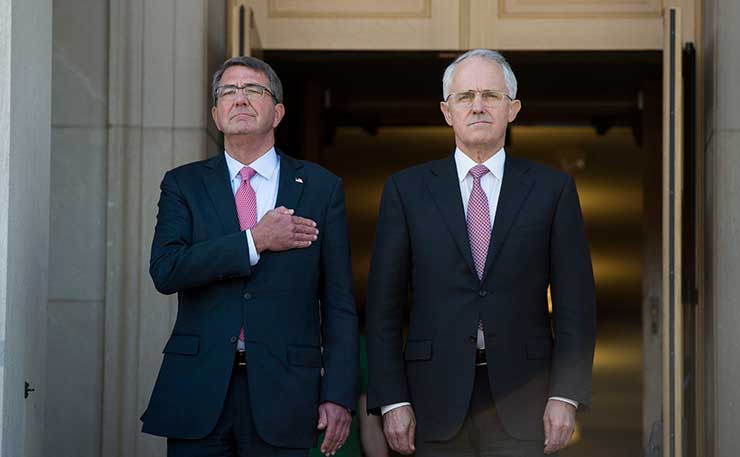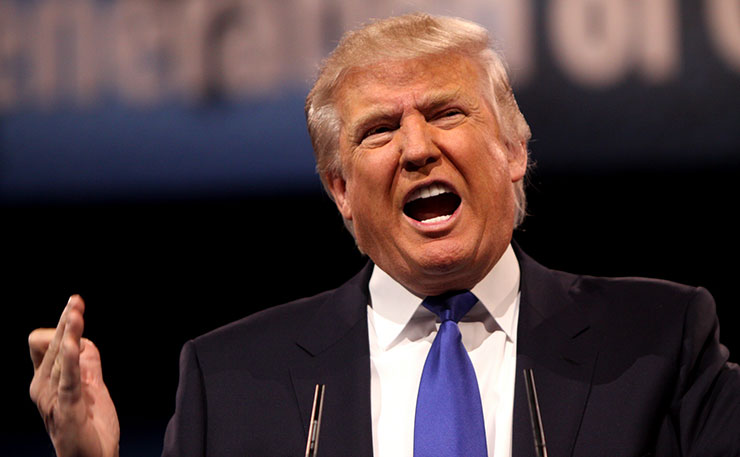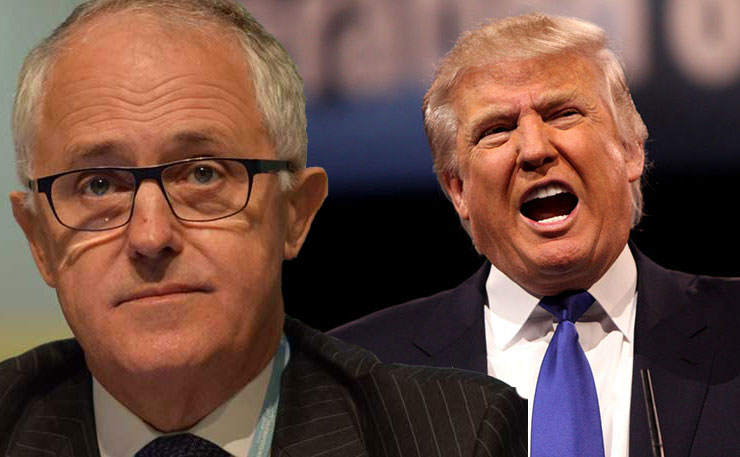It was bad enough when our prime minister and foreign minister obsequiously grovelled to Donald Trump to secure an Australian exemption from his newly-announced tariffs on iron and aluminium. Even worse is their complicity with Trump in undermining the already fragile rules-based world trading order, writes Ian McAuley.
In past times, small restaurants in Boston and New York were easy prey for the mafia. Sometimes the deal was that the restaurant had to deal with a mafia-owned business for meat, fruit and linen at inflated prices or suffer the consequences. In the highly competitive restaurant industry it only took a few cockroaches, or release of a stinking chemical, to ensure compliance. And threat of a fire could always bring the most recalcitrant restauranteur around.
A restauranteur yielding to extortion may have enjoyed a competitive advantage as their non-compliant competitors saw their reputations trashed. But over the longer term, as competitors came on board with the mafia’s demands, all suffered as patrons were turned away by high prices and poor quality, because mafia businesses aren’t likely to be delivering the highest-quality produce.
That’s why police and criminologists urge businesses to avoid dealing with extortionists trying to colonise new territory, even if avoidance involves some risk. And it’s why most reasonable people, even when they feel forced to deal with an extortionist, try to get law-enforcement authorities to clean the extortionists out of the market.

In international trade there is an extortionist at work – Donald Trump – and in grovelling subservience our Prime Minister and Foreign Minister have done a deal with the extortionist. That deal is to exempt Australian steel and aluminium producers from Trump’s tariffs – 25 per cent on steel and 10 per cent on aluminium.
And worse, our government has decided not to take the matter up with the cop on the beat, the World Trade Organization (WTO), leaving Europeans and Chinese to fight for themselves.
In giving voice to one of the few undisputed principles of economics, Chinese Commerce Minister Zhong Shan said “There are no winners in a trade war: it will only bring disaster to China and the United States and the world.”
Something strange is going on when a senior communist speaks on the side of trade liberalisation against the supposed champion of the free market.
Trump is appealing to his populist base. In America the population is split about 50-50 in support of and opposition to free trade, and opposition is strongest among those who describe themselves as “white” and “evangelical Christian”, and who have not completed college education.
That’s the easy politics of trade protection. It’s appealing at first sight, until one works through its consequences.
There are six consequences of trade protection, and their costs outweigh their benefits in five of those six consequences – or possibly in all of them.
First, there are consequences for the protected industries themselves, where jobs and profits can be maintained. That looks good initially as closures are prevented and workers are re-hired. It could, however, simply be prolonging a slow death of an industry that cannot compete in the long term, and the presence of protection may mean firms are more likely to spend their profits on distributions to executives and shareholders rather than on investment in new equipment to achieve lower costs (one can be fairly sure the workers are the last to benefit). So even this claimed benefit is not assured.
Second is the effect on downstream industries, in this case firms in manufacturing, construction and packaging that use steel and aluminium. Their input prices will rise, making these industries comparatively uncompetitive. Prices will rise for everything from Ford F-150 pickups (Trump voters’ vehicle of choice), through to cans of Budweiser Beer (real men don’t drink craft beers).
Third is the threat of trade retaliation. So far the Europeans have been restrained and clever, targeting products made in Trump supporters’ heartland. Even if the Europeans were to go through with their threats, there are plenty of substitutes for Harley-Davidson motorcycles and Levi jeans. But if a trade war breaks out it will be about the fortunes of Boeing versus Airbus and other high-value trade (but then, Boeing’s main factory is in Washington State, and there aren’t many Trump supporters on the west coast).
Fourth, and more subtly, when tariffs and other protection cut off imports, a country’s exchange rate rises, damaging the competitiveness of all trade-exposed industries, including agriculture and tourism. Americans travelling abroad may enjoy the higher dollar, but it won’t go down too well in the wheat belt and in the corn belt (perhaps if Americans travel to Europe rather than visiting their own natural wonders Trump can flog off national parks to ranchers and oilmen).

Fifth, once an administration starts giving out protection to some industries, a channel of influence for rent-seekers is opened up. Crony capitalism thrives on easily-dispensed favours for sectoral interests. In Australia we are protected somewhat from cronyism by two official organisations charged with evaluating, on economic grounds, industries’ claims for support – the Productivity Commission and the Anti-Dumping Commission.
And sixth, history teaches us that it was economic isolationism in the form of competitive protective devaluations and restrictions on imports that worsened the consequences of the 1930s Depression, paving the way for the rise of the Nazi and Fascist movements. History doesn’t seem to have been one of Trump’s electives.
Unfortunately for Trump’s critics, “free trade” has a bad name. It suffers from guilt by association – association with deals such as the Trans Pacific Partnership (TPP), which are not so much about free trade as they are about protecting established corporate interests, particularly with measures such as Investor State Dispute Settlement clauses, which can rob a nation of its sovereign capacity to make laws in the interests of its citizens.
Australia has a strong history of supporting multilateral trade liberalisation through the General Agreement on Tariffs and Trade (GATT) which morphed into the WTO. These are “rules based” systems, particularly beneficial to smaller countries. They have their own dispute-settlement mechanisms. They can accommodate measures countries may employ to look after environmental protection and labour conditions. And they have established anti-dumping rules (contrary to Trump’s claims, steel and aluminium aren’t being dumped in the US: prices are high and rising).
But the Coalition, with its TPP and country-to-country deals, and has turned away from multilateralism. The rhetoric is about “free trade”, but every limited deal locks out other countries, usually the poorest.
In carving out a deal with Trump, Turnbull and Bishop are now no less guilty of economic vandalism than a pair of populist Republican Congressmen from the American steel belt.
And who knows what favours Trump – who understands the world only in terms of win/lose transactions – expects in return?
Donate To New Matilda
New Matilda is a small, independent media outlet. We survive through reader contributions, and never losing a lawsuit. If you got something from this article, giving something back helps us to continue speaking truth to power. Every little bit counts.




